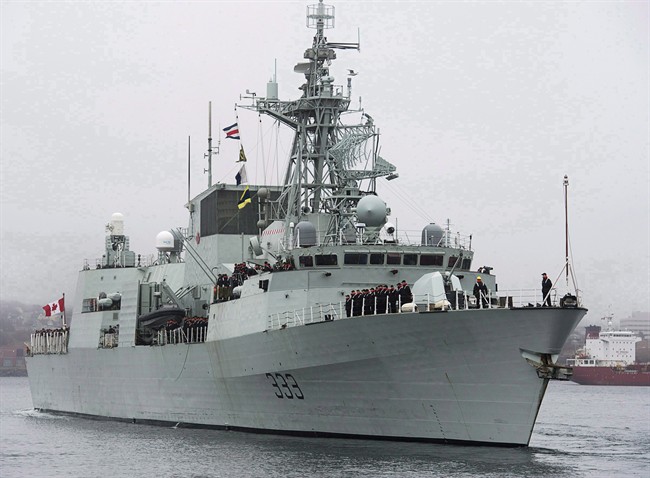An Alberta-based political think-tank says that in order for the Canadian Navy to escape the cycle of replacing a large number of ships at the same time, it’s vital the national shipbuilding program be given the funding to succeed.

The University of Calgary based Canadian Global Affairs Institute published The Royal Canadian Navy: Facing Rough Seas Wednesday outlining some of the huge challenges facing the navy.
READ MORE: Irving Shipyard development likely to go ahead despite budget concerns: Premier
Author Dr. Rob Huebert says the biggest problem facing the Navy is the inability to enact a shipbuilding policy in a timely fashion.
Huebert says the current shipbuilding program, with Halifax’s Irving Shipyard building five or six Arctic Offshore Patrol Vessels at a cost of $2.3 billion, is a good start.
The paper suggests the ever increasing costs associated with a modern navy will continue to be a problem for the military and politicians. The National Shipbuilding Strategy which is producing combat and non-combatant ships for the Navy and Coast Guard will help relieve that.
But there are questions about why it took eight years for the first steel to be cut for the vessels.
The policy paper released by the institute also looked at the mid-life refit for the Halifax-class frigates. All 12 are scheduled to undergo extensive refit to extend their working life to 2030 at a cost of about $4.3 billion. All the vessels are expected to complete the refit process by 2018.
Communication questioned
- McLean accuses Calgary third-party advertiser of ‘whipping votes’ in favour of rezoning bylaw
- Canadian curler Chelsea Carey says don’t compare me to Jennifer Jones
- Firefighters battle blaze at vacant house in northwest Calgary
- 7 sent to hospital after carbon monoxide poisoning incident in northwest Calgary
The paper also questions the previous Conservative government’s communications policy, saying it hobbled the ability of the navy to explain its role to Canadians.
The paper uses the example of the fire aboard the submarine HMCS Chicoutimi in 2004 and the grounding of HMCS Corner Brook in 2012 as examples of negative stories that affected public perception of the navy’s worth.
Huebert writes that the numerous successes of three submarines in service are rarely trumpeted.
READ MORE: Atlantic Canadians eagerly attend Irving Shipbuilding’s job fair in Fort McMurray
The strict communications policy hampered the ability of the navy to “sell” its projects to the public, he writes in the policy paper.
The Navy is rebuilding itself, but has faced many delays and challenges, Huebert writes. That’s resulted in a shortfall of ships and equipment.
The shipbuilding strategy is fundamental to correcting that, but Huebert warns it needs to be properly funded, and requires political support, for it to work.




Comments